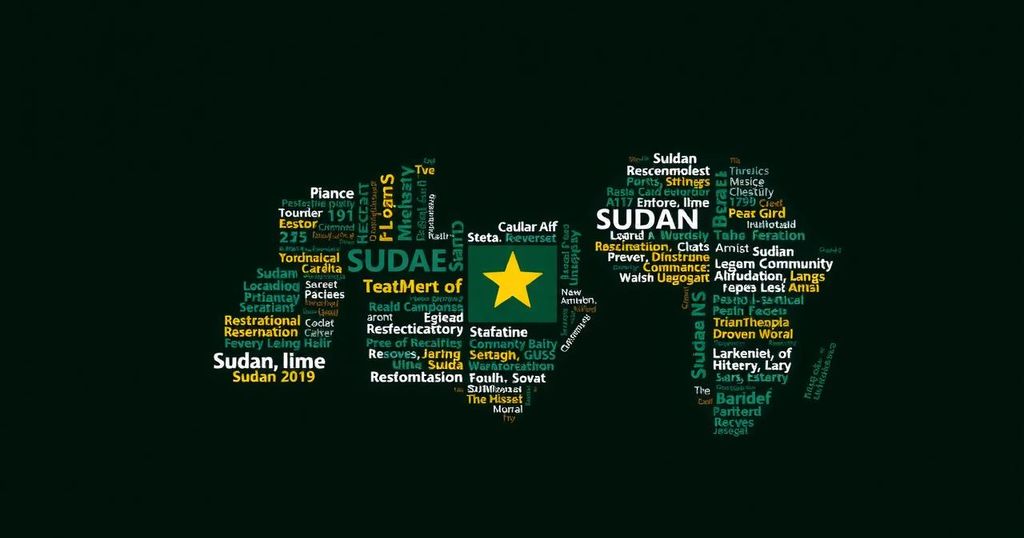U.S.-UAE Talks Shine Light on Sudan Crisis

U.S. officials, including President Biden and Vice President Harris, recently met with UAE President Mohammed Bin Zayed, focusing on Sudan rather than other global conflicts. Analyst Mohamed Hereika noted the U.S.’s designation of the UAE as a major defense partner and emphasized the need for a peaceful resolution to the Sudan crisis amidst allegations of UAE support for paramilitary forces. Both nations advocate for ending hostilities and restoring civilian governance in Sudan.
In recent discussions between U.S. President Joe Biden, Vice President Kamala Harris, and UAE President Mohammed Bin Zayed, the spotlight unexpectedly turned towards Sudan rather than more anticipated issues such as the ongoing Russia-Ukraine war or the Gaza conflict. Political analyst and journalist Mohamed Hereika remarked on this surprising focus, underscoring the significance of the U.S. formally declaring the UAE as a “major defense partner” during these talks. Hereika emphasized the crucial need identified by both nations to recognize the absence of a military solution in the Sudan crisis, advocating for immediate action to cease hostilities and restore a civilian-led government in Sudan. Despite some tensions between certain factions of Sudan’s government and the UAE, Hereika noted a general alignment in the approach of both countries concerning the situation in Sudan. The Emirati leadership has been consistent in promoting peaceful resolutions, particularly addressing the plight of Sudanese refugees in Chad. Hereika cited an online video in which a refugee urged the UAE to halt its support of the paramilitary group Rapid Support Forces (RSF). Hereika highlighted the impact of the UAE’s designation as a U.S. defense partner, asserting that it enhances the UAE’s influence within the region. Refuting claims regarding UAE support for the RSF, he noted that while international institutions have raised concerns about regional interference, there has been no direct accusation against the UAE. Interestingly, a recent report by the New York Times mentioned alleged backing of the RSF by the UAE; however, Hereika expressed surprise that diplomatic relations between Sudan and the UAE remain seemingly steady in light of these escalating allegations. The political analyst queried the UAE’s potential role as a mediator in the Sudan conflict, particularly in light of accusations from the Sudanese Armed Forces. He indicated that such perceptions of bias contributed to the Armed Forces’ withdrawal from recent negotiations in Geneva. He urged that dialogue remains the only viable solution to the conflict, concluding, “All wars eventually end at the negotiating table,” while calling for political efforts to avert a worsening humanitarian situation. Both the U.S. and the UAE reiterated their commitment to facilitating a peaceful resolution in Sudan.
The recent discussions between the United States and the United Arab Emirates regarding Sudan come amidst ongoing turmoil in the country, characterized by the conflict between various factions of government and paramilitary forces. The U.S. has been actively engaged in diplomatic efforts to stabilize the region and address the humanitarian crises arising from the conflict. The UAE’s designation as a major defense partner by the U.S. not only consolidates military ties but also positions both countries as potential peace brokers in the deteriorating situation in Sudan, which has garnered international concern.
In conclusion, the recent U.S.-UAE discussions underscore a significant pivot toward prioritizing the Sudan crisis amid broader geopolitical concerns. Analysts like Mohamed Hereika have highlighted the importance of peaceful negotiations and regional cooperation, suggesting that diplomatic efforts are crucial in resolving the ongoing conflict and restoring stability in Sudan. The reiterated commitment from both nations to seek a resolution reflects a strategic alignment that may influence future developments in the region.
Original Source: www.dabangasudan.org








